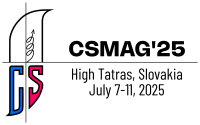Speaker
Description
Magnetic refrigeration is an innovative, eco-friendly cooling technology that offers greater efficiency compared to conventional methods. One of its key advantages is the scalability of magnetocaloric materials for various applications. However, reducing the size of the cooling system naturally diminishes its cooling power, which can be compensated by employing higher magnetic field changes. This approach, unfortunately, leads to increased energy consumption.
In this study, strategies to reduce energy demands are explored, by utilising the shape anisotropy of microwire samples. The fabrication process of microwires inherently induces strong shape anisotropy, resulting in an easy magnetisation axis along the wire’s length and a hard magnetisation axis perpendicular to it.
The magnetocaloric effect in Heusler glass-coated Ni$_{53}$Fe$_{20}$Ga$_{27}$ microwires was investigated using indirect magnetic measurements. The results show that sample rotation has impact on the magnetocaloric effect under high magnetic field changes. However, at lower magnetic field changes, the observed behaviour reveals promising opportunities for practical applications. Specifically, the magnetocaloric effect along the hard axis is negligible compared to the effect when the sample is aligned in parallel with respect to the applied magnetic field. This finding suggests the potential for achieving efficient cooling by rotating the sample within a low static magnetic field produced even by permanent magnets.
Acknowledgements
This work was supported by the projects APVV-16-0079 and VEGA 1/0180/23 and vvgs-2024-3079.
References
[1] Y. Liu et al., “Anisotropic magnetocaloric effect in Fe3−xGeTe2,” Scientific Reports, vol. 9, no. 1. Springer Science and Business Media LLC, Sep. 13, 2019. https://doi.org/10.1038/s41598-019-49654-4
[2] M. Hennel et al., “High efficiency direct magnetocaloric effect in Heusler NiMnGa microwire at low magnetic fields,” Journal of Alloys and Compounds, vol. 960. Elsevier BV, p. 170621, Oct. 2023. https://doi.org/10.1016/j.jallcom.2023.170621

